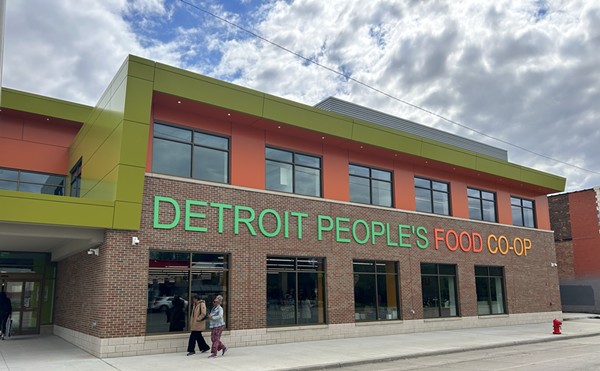When Melinda Romero moved into her two-story wood house on Ste. Anne Street in southwest Detroit more than 20 years ago, she could look out back and see the tree-shaded yards and homes of her neighbors. Now she sees a brick wall that's high enough to block the view but not the aggravation of a sprawling truck plaza that came butting up to her property line.
"They took my shade, took out my peace and quiet. Even with the TV going on, I can still hear the trucks behind there all day and night. It's going to get worse when it's summer and the windows are open."
In January 2001, after accumulating 64 acres of residential property over a period of years, the Detroit International Bridge Co. — owner of the Ambassador Bridge linking Detroit and Windsor — quickly moved to expand its existing truck plaza, razing the newly acquired homes, paving over the land and installing 11 fuel pumps and 18 toll booths to help service the 13,000 trucks that roll across the Detroit River each day.
The company was in such a rush to develop the property it didn't wait to obtain the requisite zoning permits from the city. Neither, apparently, did it bother to actually buy all the land it took control of. As reported last week ("Abridging the law," Metro Times, March 1), the city is now saying the bridge company's expansion includes three parcels still owned by Detroit.
The city responded to the permit problem by hitting the company with 37 citations for zoning violations and issuing a cease-work order. When the company ignored the citations and the order, the issue wound up in Wayne Circuit Court, where lawyers for the company argued that their client isn't bound by the city's zoning laws.
The privately owned bridge company, they contended, is actually an instrument of the federal government, and, as such, doesn't have to abide by local land-use ordinances. The bridge, which carries $30 million in trade daily, is too important to international commerce for operations to be hemmed in by local concerns, they said. Likewise, because federal customs stations are located within the sprawling truck plaza, operation of the facility involves matters of national security.
In August 2004, Circuit Court Judge James Rashid decided in favor of the company.
"The DIBC is responsible for managing the flow of traffic across an international border in a way that allows the various federal agencies to perform their governmental functions and furthers the national interest in interstate/international commerce," Rashid wrote. It didn't matter that the federal government owned none of the 64 acres the case focused on. It didn't even need to have facilities on that portion of the property. Because of the importance of the functions being carried out by the bridge company, Rashid concluded, "the City of Detroit, its agents, servants and employees are permanently enjoined from applying or otherwise attempting to enforce City of Detroit zoning ordinances to property within the Bridge complex."
The ruling hit area residents hard. But the decision also had broader implications, raising concerns about the amount of unchecked power a private company can wield when cloaked in a federal mantle.
The Michigan Court of Appeals will consider those concerns on April 21, when it hears oral arguments in a case that has a lot of people watching with interest.
Zoned out
Dan Stamper, president of the Detroit International Bridge Co. (DIBC), says the company has always been a "federal instrument." It was, after all, a special act of Congress in 1921 that authorized private-sector construction and operation of what was to become the Ambassador Bridge by the American Transit Co., predecessor to the DIBC.
From the beginning, local approval of actions regarding the bridge appeared to be an afterthought. American Transit started building the span 45 days before Detroit voters actually gave their assent in a special election.
As for concerns that Rashid's ruling removes needed oversight of the company and its operations, Stamper says there's no need to worry.
The company, he says, is "answerable to everybody, from community groups, to the city's health and safety laws, to the states planning laws and the feds. Some people will say we're outside the realm of all those, but I say we're within the realm of all those. We're probably the most governed company in both countries."
State Rep. Steve Tobocman, a Detroit Democrat whose district includes the truck plaza and the neighborhoods around it, has been involved with the case since first working on the city's behalf as a pro bono lawyer. Tobocman thinks Judge Rashid erred, and that the "federal instrument" argument is a smokescreen.
"The construction projects are for private, money-making activities," he says. Because no federal facilities are located on the property that's being disputed, the company's claim of a federal mandate doesn't come into play. He also says the city, which has recently been approached for a rezoning by the company, shouldn't fulfill that request until this case is decided.
"I believe that granting the rezoning now will unnecessarily reward a private corporation that has defied the city of Detroit's requests to operate within the confines of the laws," he says.
Tobocman is far from being the only one hoping Rashid's ruling is overturned by the appellate court.
Vince Murray, head of the nonprofit Bagley Housing Association, says Rashid's decision had a direct effect on his group's revitalization efforts.
With the truck plaza bordering the Bagley neighborhood to the south and west, uncertainty about future expansion has had a chilling effect. The group has already scuttled plans to build new homes on 20th Street.
Concern that the company may push further into surrounding neighborhoods is not an idle worry.
"We continue to look at ways to expand our facilities as needed," says Stamper.
Murray says he was surprised that the bridge company won in the lower court. "This gives them too much power outside the city of Detroit's control," he says. "This needs to be turned around."
That's certainly the sentiment of the city's lawyers.
In their appellate brief, attorneys for the city claimed the DBIC never proved it met criteria for the federal pre-emption of local law.
"Federal pre-emption of local ordinances must be based on one of three predicates," city attorney Linda Fegins wrote. Those three criteria include express congressional approval of pre-emptive action; a circumstance where the company exclusively provides a service for the entire country; or a situation where local and federal laws conflict.
"None of the three tests described above are met in this case," Fegins wrote.
If the city is wrong, and the bridge company is not bound by local zoning laws, then southwest Detroit — where population is growing, unusual for the city — will have a much more difficult time keeping that momentum going. Because of that threat, Ste. Anne's Catholic Church, the Bagley Housing Association, the Mexicantown Community Development Corporation and other nonprofit organizations, filed an amicus brief supporting the city's case last June. In it, they contend that despite its recent revitalization, "the area is vulnerable to slipping into stagnation or negative growth." Their concern is that "the unregulated growth of the Ambassador Bridge, which will be the inevitable result of affirming the Circuit Court's Opinion, will snuff out this fragile resurgence, devalue the investment that has taken place to date and make life intolerable for the residents and businesses located in the bridge's path."
Big picture
John Mogk, professor of urban development and international trade at Wayne State University's law school, says the case is an important one.
"It has major implications for land that is privately owned and zoned by the city in and around the bridge facility," Mogk says. "The major ramification would be at the neighborhood level. To the extent that the bridge company prevails, it might suggest it is free to continue to expand its holdings with impunity, without the city having any control of the expansion."
Mogk makes another point: Even recognized federal agencies tend to treat the local government with some degree of respect, he says, something he does not always see in the case of the DIBC.
"There's generally an attempt by federal agencies to keep good will," he says. "A federal agency does not act like a steamroller, and tries to cooperate with local regulations whenever possible. This [development] would be an exception to what is normally the case."
But it's not just on the local level that the case is significant.
Bill Goodman, legal director at the New York-based Center for Constitutional Rights, a group that monitors constitutional law cases, says that these types of cases have become more common in recent years. Although the specifics of the bridge case are unusual due to circumstances and geography, he says, the larger repercussions are something of concern to everyone.
"The implications are basically the privatization of government," he says. He describes the company's actions as being similar to those of Halliburton, the private corporation that handles much of the U.S. military's day-to-day affairs. In both cases, Goodman says, "Here's a private company taking on the mantle of government and telling people you can't regulate us. It's something people should be concerned and frightened about."
Ben Lefebvre is a Metro Times staff writer. Send comments to [email protected] or call 313-202-8015.




